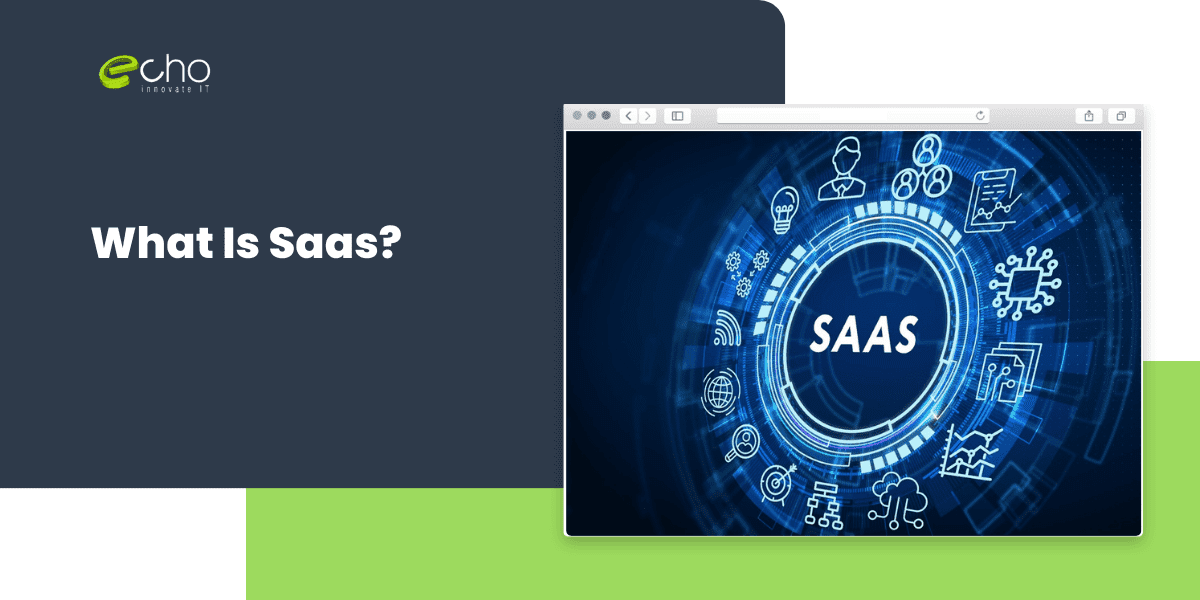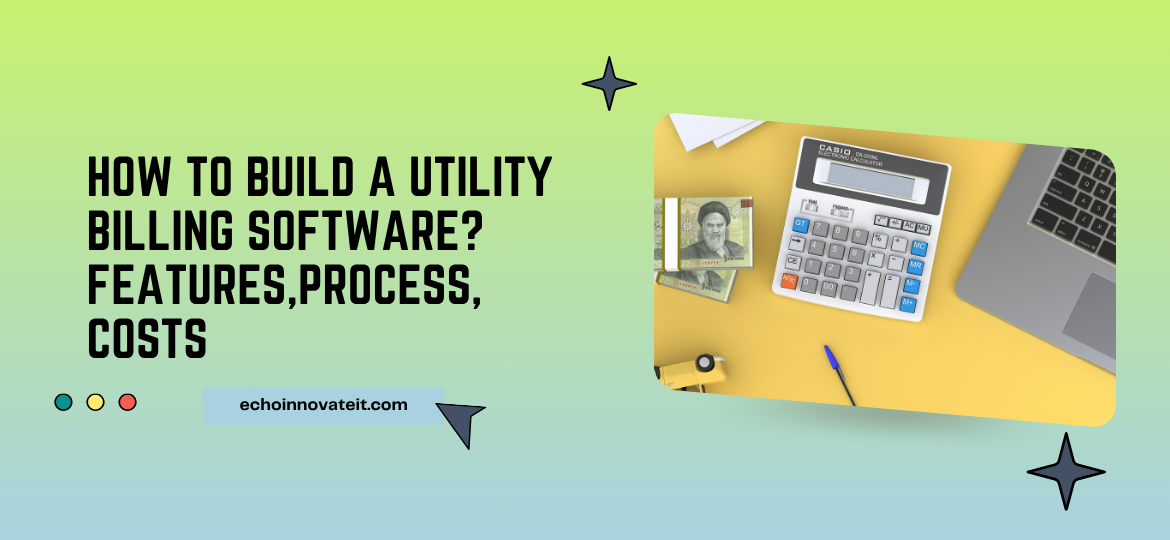Quick Summary
SaaS apps have changed how businesses operate by offering cost-effective and practical solutions enabling companies to streamline operations and stimulate growth. Unlike traditional Software, SaaS product solutions are delivered over the Internet, requiring installation and manual upgrades. This eliminates the need for complicated settings and offers seamless accessibility from any device with an Internet connection.
In the dynamic world of software development, SaaS platforms has emerged as a game-changer, providing businesses with scalable and efficient solutions. Whether you’re embarking on creating a SaaS platform, developing a comprehensive solution, building an intuitive app, or launching a groundbreaking SaaS product, the possibilities are endless.
Without the hassle of managing hardware, infrastructure, or Software updates, businesses can benefit from a robust and feature-rich SaaS software platform.
SaaS Industry Market Share and Statistics
- Industry projections estimate that the global SaaS market will reach a startling $157 billion by 2024.
- The SaaS industry has increased by around 500% over the past seven years and as of 2023, the Saas market valuation is worth over $195 billion.
Numerous factors, such as the rising popularity of SaaS cloud computing, the necessity for scalable and affordable on-demand computing software solutions, and the requirement for remote collaboration tools, can be attributed to this rapid expansion.
What Is Saas?
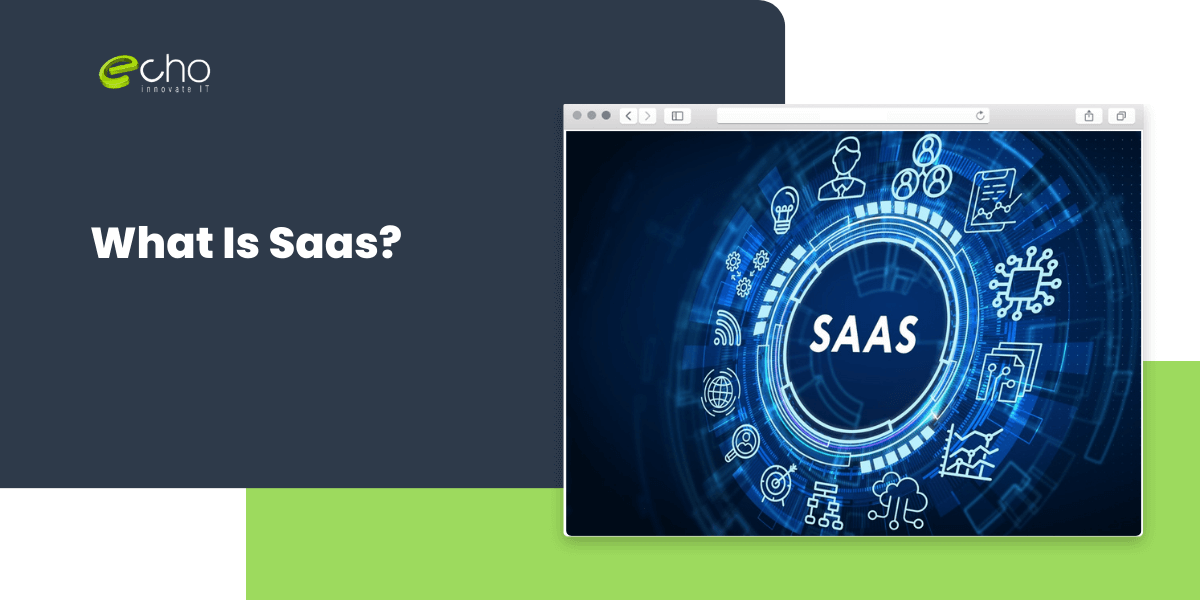
SaaS product uses a subscription-based pricing model in which customers pay a monthly or annual price to access and utilize the software delivery program. Users can scale their usage and expenditures following their demands, making this pay-as-you-go method flexible and cost-effective.
How Does SaaS Work?
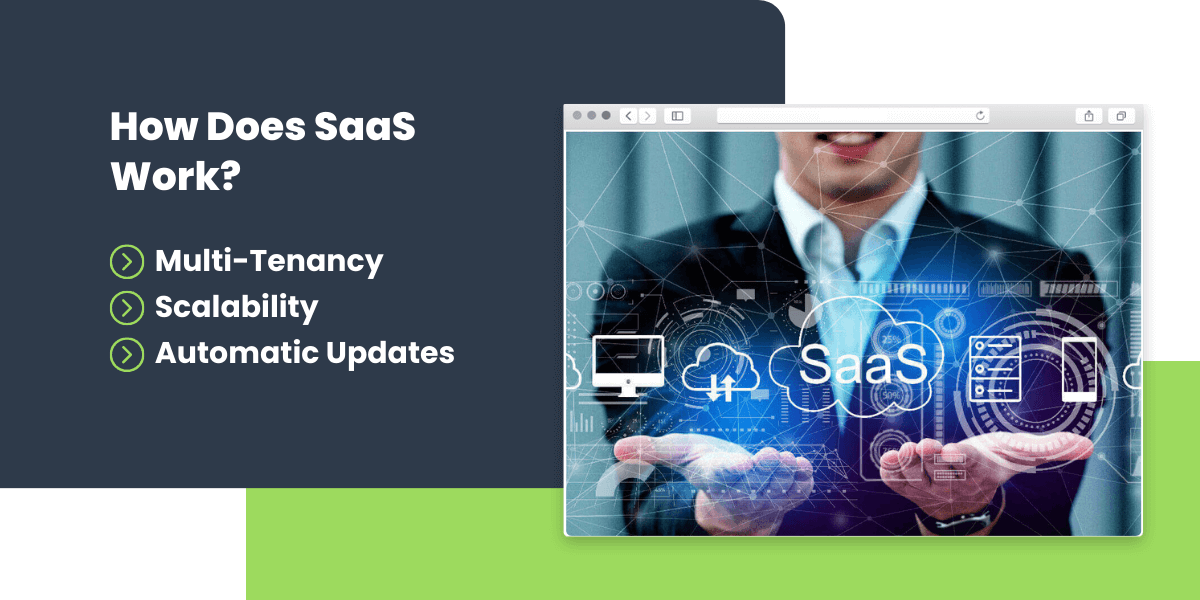
Multi-Tenancy
Multi-tenancy, in which a single instance of the program supports several users or “tenants,” is one of the critical components of SaaS. Data security and privacy are guaranteed by isolating and storing each tenant’s data separately.
Scalability
SaaS product solutions are made to accommodate a range of user demands and workloads. By leveraging the underlying cloud infrastructure, SaaS providers can quickly scale their SaaS Application Development to accommodate growing user bases or sudden spikes in usage.
Automatic Updates
With SaaS, software updates and maintenance burden shifts from the user to the provider. Due to the smooth ongoing distribution of updates and changes, users can always access the newest features and security patches.
Types Of Saas Products
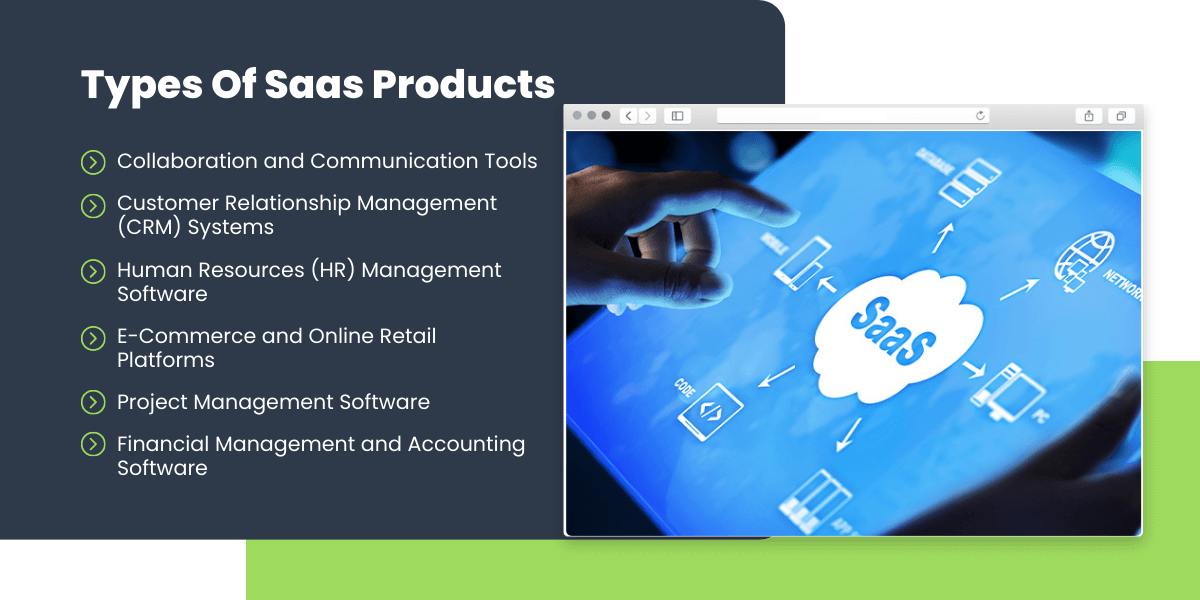
Collaboration and Communication Tools
Teams can collaborate in real-time and across geographical boundaries due to these SaaS software products. With the help of team communication tools like Slack and Microsoft Teams and project management platforms like Asana and Trello, these SaaS solutions enable businesses to improve processes, increase productivity, and cultivate efficient teamwork.
Customer Relationship Management (CRM) Systems
Systems for managing customer relationships (CRM) have revolutionized how companies handle client interactions and boost sales. These SaaS applications offer a centralized hub for managing contacts, nurturing customer relationships, and tracking leads. Businesses may optimize their marketing tactics, improve client engagement, and streamline their sales processes with well-known choices like Salesforce, HubSpot CRM, and Zoho CRM.
Human Resources (HR) Management Software
Managing human resources efficiently is crucial for organizations of all sizes. SaaS-based Human Resources (HR) management software simplifies HR processes, including employee onboarding, performance management, time tracking, and payroll. With SaaS solutions like BambooHR, ADP Workforce Now, and Zenefits, businesses can automate administrative tasks, enhance employee engagement, and ensure compliance with labor laws and regulations.
E-Commerce and Online Retail Platforms
For businesses venturing into the world of e-commerce, SaaS provides robust solutions to establish and manage online stores. E-commerce and online retail saas platforms offer features such as inventory management, secure payment processing, and customizable storefronts. Leading SaaS products in this domain include Shopify, BigCommerce, and WooCommerce (a WordPress plugin). These platforms empower businesses to create engaging online shopping experiences, expand their customer base, and optimize their online sales channels.
Project Management Software
Project management software is crucial in keeping projects organized, on track, and within budget. SaaS-based project management tools like Monday.com, Basecamp, and Wrike offer comprehensive features like task management, scheduling, document sharing, and team collaboration. With these tools, teams can effectively plan, execute, and monitor projects, ensuring efficient resource allocation and timely delivery.
Financial Management and Accounting Software
Accurate financial management and streamlined accounting processes are vital for businesses to thrive. SaaS-based financial management and accounting software simplify tasks like bookkeeping, invoicing, expense tracking, and financial reporting. Unique SaaS solutions include QuickBooks Online, Xero, and Wave. These platforms empower businesses to efficiently manage their finances, gain insights into their financial health, and ensure compliance with accounting standards.
How To Develop A Saas Product?
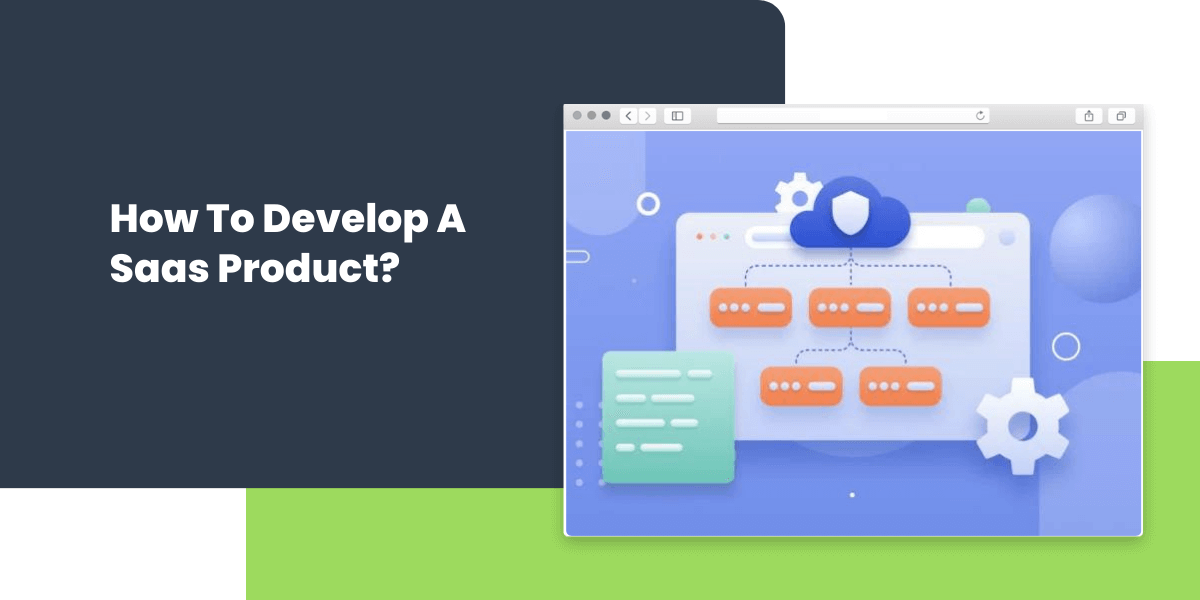
Idea Validation
- Start by validating your SaaS product idea.
- Conduct market research to identify potential competitors, target audience, and market demand.
- Ensure that your idea solves a real problem and offers unique value.
Define Product Scope
Clearly define the scope to develop your SaaS product. Outline its features, functionalities, and target audience. This step will help you stay focused and prioritize saas development efforts.
Design User Experience (UX)
- Craft an intuitive and user-friendly interface for your SaaS product.
- Invest time designing seamless user experiences, simplifying workflows, and ensuring a visually appealing design.
- Remember, a great UX can make or break your product's success.
Choose the Right Technology Stack
Decide which technology stack is best for your SaaS product. Think about the system’s scalability, security, and capacity for system integration. Popular options include scripting languages like Python or JavaScript, frameworks like Ruby on Rails or React, and cloud services like Microsoft Azure or Amazon Web Services (AWS). Angular JS development is also an ideal option for SaaS development services.
Backend Development
Create your SaaS product’s backend, which consists of server-side logic, database administration, and APIs. Ensure sufficient security measures are in place to protect user data and prevent unauthorized access.
Frontend Development
Implement the front end of your SaaS product, focusing on creating a responsive and engaging user interface. Leverage modern front-end frameworks like React or Angular to build dynamic and interactive user experiences.
Data Storage and Management
Establish a scalable and secure data storage solution for your SaaS product. Use managed databases like Amazon RDS or Google Cloud SQL to efficiently handle data storage and retrieval.
Integration Capabilities
Design your SaaS product with integration capabilities in mind. Explore options to integrate with popular third-party services and APIs, providing users with enhanced functionality and seamless experiences.
Testing and Quality Assurance
Conduct rigorous quality assurance processes to identify and rectify bugs or usability issues. Perform functional, performance, and security testing to ensure a stable and reliable product.
Deployment and Release
- Prepare for product deployment and release.
- Choose a reliable hosting cloud platform to deploy your SaaS product.
User Feedback and Iteration
Once your SaaS product is live, actively gather user feedback and iterate based on their needs and preferences. Continuously improve your product based on user insights to deliver an exceptional experience.
Customer Support and Maintenance
Provide exceptional customer support to address user queries, concerns, and issues promptly. Regularly maintain and update your SaaS product to remain secure, reliable, and current with industry trends.
Best Examples Of Saas Companies
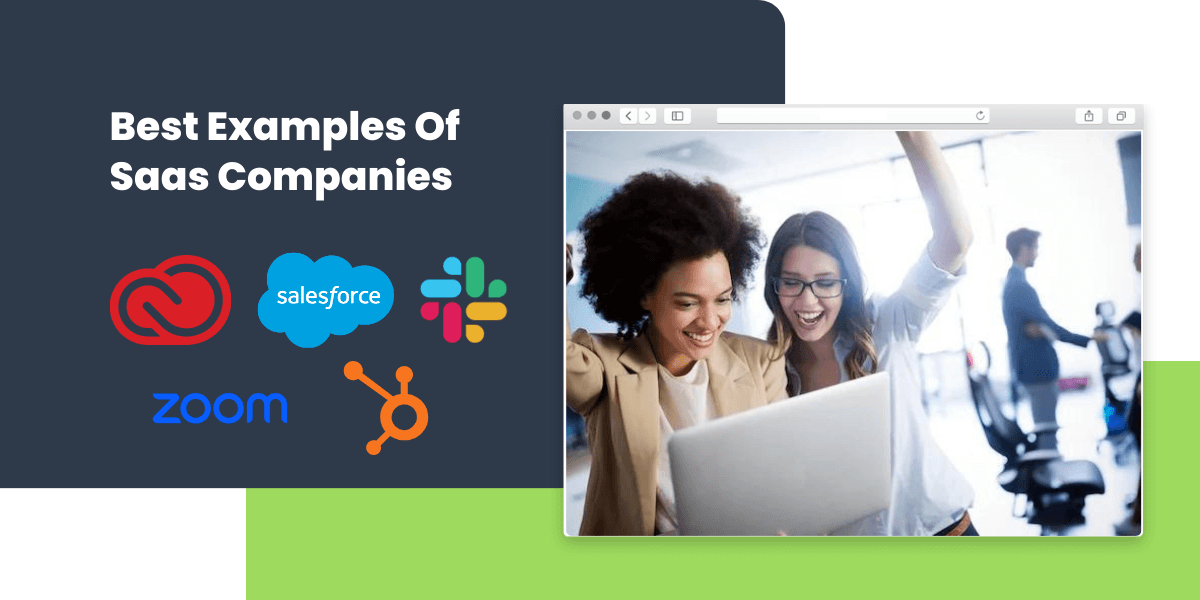
SaaS companies have disrupted industries from small startups to global enterprises and paved the way for innovation.
1. Salesforce
Salesforce is a Software as a Service (SaaS) leader and provides a full range of customer relationship management (CRM) solutions. Thanks to its robust saas platform and comprehensive functionality, Salesforce has enabled organizations of all sizes to streamline sales processes, improve client interactions, and spur revenue development. Its cutting-edge approach to cloud-based CRM has become the benchmark for SaaS businesses worldwide.
2. Slack
Slack is a model SaaS business regarding team collaboration and communication. Slack has revolutionized real-time team communication and collaboration through its user-friendly interface and frictionless integrations. Slack is the go-to platform for effective and productive teamwork in tiny businesses and giant corporations.
3. Zoom
Zoom has emerged as the industry leader in video conferencing and online communication at a time when remote work and virtual meetings have become commonplace. Thanks to its user-friendly interface and dependable performance, Zoom has transformed how people communicate and collaborate for organizations and individuals.
4. HubSpot
As a pioneer in inbound marketing and sales software, HubSpot has established itself as a prominent SaaS company. With features such as content management, lead nurturing, and marketing automation, HubSpot has helped countless organizations succeed in the digital age.
5. Dropbox
Dropbox has become synonymous with simplicity and convenience regarding cloud storage and file sharing. Its cross-platform compatibility and seamless integration with other tools make it a top choice for reliable cloud storage.
6. Adobe Creative Cloud
With its potent SaaS apps for graphic design, video editing, web development, and more, Adobe Creative Cloud has wholly transformed the creative sector. Professionals and aspiring creatives can use Adobe Creative Cloud’s tools, which range from Photoshop to Premiere Pro, to realize their ideas. Thanks to its cloud-based subscription strategy, Customers can access the most recent upgrades and features.
7. Shopify
Shopify has significantly changed how businesses design and manage their online stores regarding e-commerce platforms. Shopify’s user-friendly interface, adaptable templates, and extensive saas app marketplace let business owners launch their online stores quickly. Because it offers an all-in-one saas solution for order fulfillment, payment processing, and inventory management, it has become the leading choice for online retailers globally.
What Are The Advantages Of Saas?
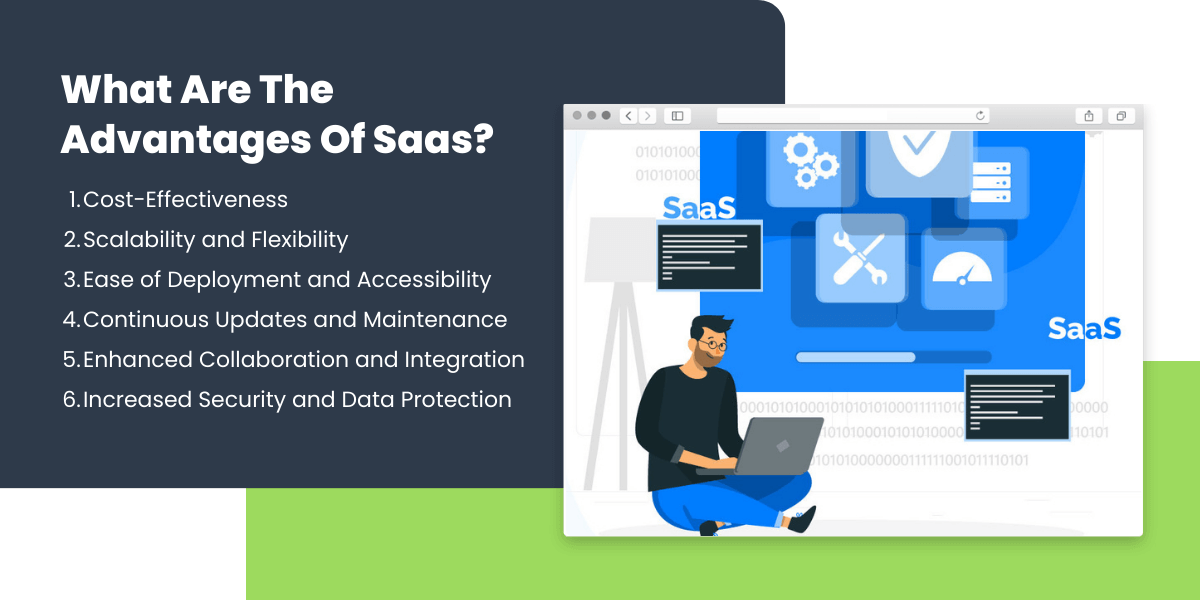
SaaS offers a wide range of advantages, making it a preferred choice for organizations across industries.
Cost-Effectiveness
One of the primary advantages of SaaS is its cost-effectiveness. SaaS operates on a subscription model, unlike traditional software solutions that require a substantial upfront investment in licenses and infrastructure. This means you pay a predictable monthly or annual fee, allowing you to allocate your budget more efficiently. Additionally, SaaS eliminates the need for costly hardware and ongoing maintenance, as the provider handles updates and infrastructure management.
Scalability and Flexibility
SaaS offers unmatched scalability and flexibility. With traditional Software, scaling up or down often requires significant effort and resources. In contrast, SaaS allows you to adjust your subscription to match your changing needs easily. Whether you need to add or remove users, increase storage capacity, or access additional features, SaaS providers offer seamless scalability to accommodate your evolving requirements. This flexibility ensures that your software solution aligns with your business growth.
Ease of Deployment and Accessibility
Software access and deployment have always been complex with SaaS. SaaS applications are often cloud-based and accessible through a web browser, unlike on-premises Software, which frequently necessitates complicated installations and configurations. This indicates that no lengthy setup is required before using the app. Additionally, SaaS enables remote work, collaboration, and productivity by allowing users to access their applications and data via the Internet from any location.
Continuous Updates and Maintenance
SaaS relieves businesses from the burden of software updates and maintenance. SaaS providers take care of all necessary upgrades, guaranteeing you have effortless access to the newest features and security patches. Doing so removes the requirement for manual upgrades and the danger of employing out-of-date Software. Furthermore, SaaS providers handle system upkeep, such as backups, security, and performance optimization, freeing you to concentrate on your primary SaaS Development company goals.
Enhanced Collaboration and Integration
SaaS solutions excel in facilitating collaboration and integration. Many SaaS applications are specifically designed to enable seamless teamwork and information sharing. Features like real-time collaboration, document sharing, and centralized data storage streamline workflows and foster effective communication among team members, regardless of location. Moreover, SaaS applications often offer integrations with popular tools and platforms, allowing for a cohesive and efficient SaaS Software Developer ecosystem.
Increased Security and Data Protection
SaaS service providers prioritize security and data protection to safeguard your sensitive information. With dedicated teams of experts and robust security measures, SaaS applications often offer higher guarantees than on-premises SaaS solutions. You may reduce security risks and ensure compliance with data privacy laws by utilizing the knowledge of SaaS providers.
Conclusion
As a game-changer for the software business, Software as a Service (SaaS) has several benefits, including cost-effectiveness, scalability, ease of deployment, continuous upgrades, improved collaboration, and higher security. By adopting the software-on-demand SaaS model, businesses can use robust software solutions while concentrating on their core skills.
If you want to build custom saas solutions, Echoinnovate IT can help. We build custom Saas solutions for global clients from diverse industries. You can also hire professional saas software developers with us at flexible and affordable costs. Avail of our staff augmentation services for IT and get your saas platform developed.
FAQs
Which is the first SaaS system built from scratch?
Salesforce was founded in 1999. It continues to be a model SaaS business today, revolutionizing how companies handle client relationships.
How Much Does it Cost to Build a SaaS Application?
It can vary significantly based on various variables, including the Software’s complexity, the number of features, the availability of saas development services resources, and the technological stack selected.
Which three main principles do we follow with SaaS?
Multi-tenancy,
Subscription-based Pricing, and
Centralized Management.
What essential features and components should instructional apps include?
Instructional apps should include features that enhance the learning experience and provide value to users. Some essential components are interactive lessons, progress tracking, personalized content recommendations, discussion forums, and gamification elements. The ability to access content offline and compatibility across different devices can also contribute to a seamless user experience.
